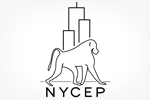NYCEP, the New York Consortium in Evolutionary Primatology, is a graduate research and training program funded since 2003 by an NSF IGERT award and for 11 previous years by an NSF Research Training Groups (RTG) award. In drawing faculty from City University of New York, Columbia University, New York University… more »
NYCEP, the New York Consortium in Evolutionary Primatology, is a graduate research and training program funded since 2003 by an NSF IGERT award and for 11 previous years by an NSF Research Training Groups (RTG) award. In drawing faculty from City University of New York, Columbia University, New York University, the American Museum of Natural History (and its novel Richard Gilder Graduate School), and the Wildlife Conservation Society (home of the Bronx Zoological Park), NYCEP represents a rare combination of public and private universities together with privately endowed (and publicly assisted) institutions dedicated to education and bringing science to the public. We also have partnerships with universities and research institutes in Germany and the greater New York City area.
The program spans the integrative and interdisciplinary field of “evolutionary primatology,” which applies methods and theories from a broad range of the natural sciences to the study of the biology and evolution of humans and other primates. Our consortium links students with over 60 faculty whose research perspectives on human and nonhuman primates include behavior/ecology, comparative morphology/paleontology, and molecular/population genetics. Students take courses in all these areas, attend seminars drawing on the staff of all five institutions, and have multiple opportunities to conduct original research at international field sites, laboratories, and museums. NYCEP is unique for the range and diversity of courses and research opportunities that it offers.
Since 1992, we have trained over 160 students (including 95 females and 20 from groups underrepresented in science) with benefit from NSF funding, and we awarded 53 Ph.D.s to those with direct NSF/NYCEP funding (26 female, 27 male); many have obtained high-profile positions in universities, zoos and industry. In the past seven years, IGERT support has enabled NYCEP to implement novel and successful educational initiatives, including: a year-long course dedicated to ethical awareness and professionalism; a semi-annual conference showcasing NYCEP research; required international field-based research experiences; and undergraduate teaching and outreach experiences for trainees.
With renewed IGERT support, NYCEP will broaden interdisciplinary training and research in conservation science and paleoanthropology; implement a number of innovative curricular initiatives that ensure interdisciplinarity; restructure the training program to enable students to progress faster towards the Ph.D. and publish earlier; expand international research opportunities and partnerships with programs in geological sciences at Rutgers, Lamont-Doherty Earth Observatory of Columbia, and AMNH, in genetics and human evolution at Max-Planck Institute/Leipzig and Universität Tübingen, and in field behavior and conservation in South Africa, Kenya, Ecuador and Peru; extend its relationships with the Richard Gilder Graduate School at AMNH and in conservation science with WCS; and enhance the NYCEP community by involving graduate students more extensively in NYCEP-wide activities. This innovative training program produces graduate students who are professionally and technically qualified to lead scientific research, education and public outreach in an increasingly socio-politically complex, interdisciplinary and global arena.
IGERT is an NSF-wide program intended to meet the challenges of educating U.S. Ph.D. scientists and engineers with the interdisciplinary background, deep knowledge in a chosen discipline, and the technical, professional, and personal skills needed for the career demands of the future. The program is intended to catalyze a cultural change in graduate education by establishing innovative new models for graduate education and training in a fertile environment for collaborative research that transcends traditional disciplinary boundaries. « less
Project members' contributions to the library and showcase are listed here.






